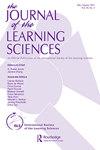一个巴掌拍不响:科学推理和自我调节过程如何影响论证质量
IF 3.9
1区 教育学
Q1 EDUCATION & EDUCATIONAL RESEARCH
引用次数: 9
摘要
提高科学推理和论证能力是科学教育的核心目标。由于其复杂性,自我调节对成功的科学推理很重要。本研究首次尝试探讨科学推理和自我调节过程如何共同影响论证质量。方法以30名大学生为研究对象,采用探究学习过程中科学推理和自我调节的细粒度过程数据,考察科学推理和自我调节过程的共现与论证质量的关系。当使用认知网络分析对科学推理和自我调节过程的共现进行建模时,论证质量高或低的学生之间的差异变得明显。论证质量高的学生比论证质量低的学生更多地共同参与不同的科学推理过程,并且他们在自我调节和科学推理过程之间建立了更多的联系。这些发现为科学推理教学提供了教育意义。在教学过程中将自我调节与科学推理相结合,有利于提高学生的科学推理和论证能力。本文章由计算机程序翻译,如有差异,请以英文原文为准。
It takes two to tango: How scientific reasoning and self-regulation processes impact argumentation quality
ABSTRACT Background Improving scientific reasoning and argumentation are central aims of science education. Because of their complex nature, self-regulation is important for successful scientific reasoning. This study provides a first attempt to investigate how scientific reasoning and self-regulation processes conjointly impact argumentation quality. Methods In a study with university students (N = 30), we used fine-grained process data of scientific reasoning and self-regulation during inquiry learning to investigate how the co-occurrences between scientific reasoning and self-regulation processes are associated with argumentation quality. Findings When modeling the co-occurrence of scientific reasoning and self-regulation processes using epistemic network analysis, differences between students showing either high or low argumentation quality become apparent. Students who showed high argumentation quality engaged in different scientific reasoning processes together more often than students with low argumentation quality, and they made more connections between self-regulation and scientific reasoning processes. Contribution These findings offer educational implications for teaching scientific reasoning. Integrating self-regulation and scientific reasoning during instruction could be beneficial for improving scientific reasoning and argumentation.
求助全文
通过发布文献求助,成功后即可免费获取论文全文。
去求助
来源期刊

Journal of the Learning Sciences
Multiple-
CiteScore
10.70
自引率
5.30%
发文量
17
期刊介绍:
Journal of the Learning Sciences (JLS) is one of the two official journals of the International Society of the Learning Sciences ( www.isls.org). JLS provides a multidisciplinary forum for research on education and learning that informs theories of how people learn and the design of learning environments. It publishes research that elucidates processes of learning, and the ways in which technologies, instructional practices, and learning environments can be designed to support learning in different contexts. JLS articles draw on theoretical frameworks from such diverse fields as cognitive science, sociocultural theory, educational psychology, computer science, and anthropology. Submissions are not limited to any particular research method, but must be based on rigorous analyses that present new insights into how people learn and/or how learning can be supported and enhanced. Successful submissions should position their argument within extant literature in the learning sciences. They should reflect the core practices and foci that have defined the learning sciences as a field: privileging design in methodology and pedagogy; emphasizing interdisciplinarity and methodological innovation; grounding research in real-world contexts; answering questions about learning process and mechanism, alongside outcomes; pursuing technological and pedagogical innovation; and maintaining a strong connection between research and practice.
 求助内容:
求助内容: 应助结果提醒方式:
应助结果提醒方式:


